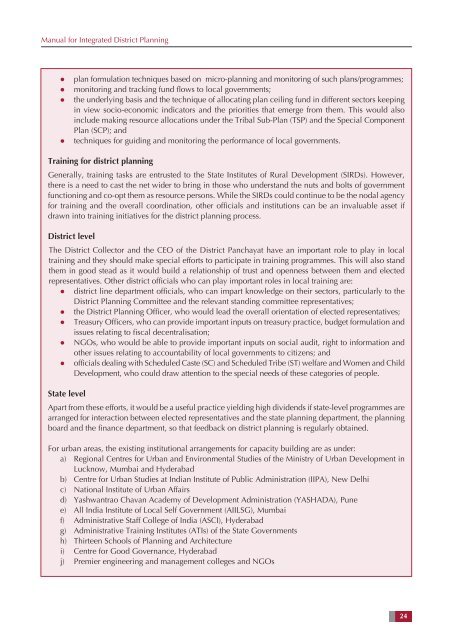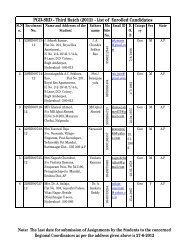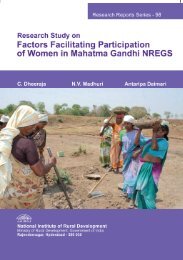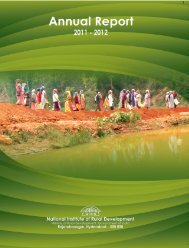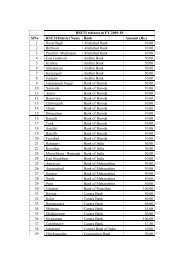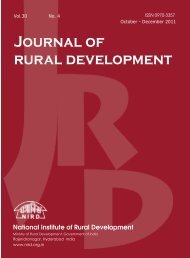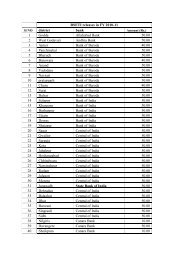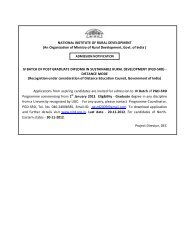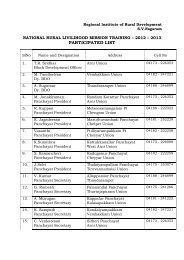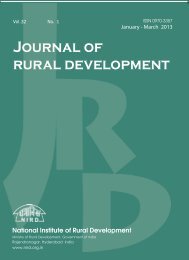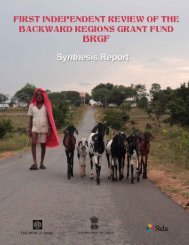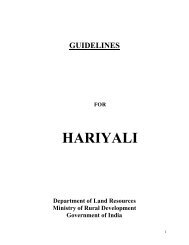Manual for Integrated District Planning - National Institute of Rural ...
Manual for Integrated District Planning - National Institute of Rural ...
Manual for Integrated District Planning - National Institute of Rural ...
Create successful ePaper yourself
Turn your PDF publications into a flip-book with our unique Google optimized e-Paper software.
<strong>Manual</strong> <strong>for</strong> <strong>Integrated</strong> <strong>District</strong> <strong>Planning</strong><br />
• plan <strong>for</strong>mulation techniques based on micro-planning and monitoring <strong>of</strong> such plans/programmes;<br />
• monitoring and tracking fund flows to local governments;<br />
• the underlying basis and the technique <strong>of</strong> allocating plan ceiling fund in different sectors keeping<br />
in view socio-economic indicators and the priorities that emerge from them. This would also<br />
include making resource allocations under the Tribal Sub-Plan (TSP) and the Special Component<br />
Plan (SCP); and<br />
• techniques <strong>for</strong> guiding and monitoring the per<strong>for</strong>mance <strong>of</strong> local governments.<br />
Training <strong>for</strong> district planning<br />
Generally, training tasks are entrusted to the State <strong>Institute</strong>s <strong>of</strong> <strong>Rural</strong> Development (SIRDs). However,<br />
there is a need to cast the net wider to bring in those who understand the nuts and bolts <strong>of</strong> government<br />
functioning and co-opt them as resource persons. While the SIRDs could continue to be the nodal agency<br />
<strong>for</strong> training and the overall coordination, other <strong>of</strong>ficials and institutions can be an invaluable asset if<br />
drawn into training initiatives <strong>for</strong> the district planning process.<br />
<strong>District</strong> level<br />
The <strong>District</strong> Collector and the CEO <strong>of</strong> the <strong>District</strong> Panchayat have an important role to play in local<br />
training and they should make special ef<strong>for</strong>ts to participate in training programmes. This will also stand<br />
them in good stead as it would build a relationship <strong>of</strong> trust and openness between them and elected<br />
representatives. Other district <strong>of</strong>ficials who can play important roles in local training are:<br />
• district line department <strong>of</strong>ficials, who can impart knowledge on their sectors, particularly to the<br />
<strong>District</strong> <strong>Planning</strong> Committee and the relevant standing committee representatives;<br />
• the <strong>District</strong> <strong>Planning</strong> Officer, who would lead the overall orientation <strong>of</strong> elected representatives;<br />
• Treasury Officers, who can provide important inputs on treasury practice, budget <strong>for</strong>mulation and<br />
issues relating to fiscal decentralisation;<br />
• NGOs, who would be able to provide important inputs on social audit, right to in<strong>for</strong>mation and<br />
other issues relating to accountability <strong>of</strong> local governments to citizens; and<br />
• <strong>of</strong>ficials dealing with Scheduled Caste (SC) and Scheduled Tribe (ST) welfare and Women and Child<br />
Development, who could draw attention to the special needs <strong>of</strong> these categories <strong>of</strong> people.<br />
State level<br />
Apart from these ef<strong>for</strong>ts, it would be a useful practice yielding high dividends if state-level programmes are<br />
arranged <strong>for</strong> interaction between elected representatives and the state planning department, the planning<br />
board and the finance department, so that feedback on district planning is regularly obtained.<br />
For urban areas, the existing institutional arrangements <strong>for</strong> capacity building are as under:<br />
a) Regional Centres <strong>for</strong> Urban and Environmental Studies <strong>of</strong> the Ministry <strong>of</strong> Urban Development in<br />
Lucknow, Mumbai and Hyderabad<br />
b) Centre <strong>for</strong> Urban Studies at Indian <strong>Institute</strong> <strong>of</strong> Public Administration (IIPA), New Delhi<br />
c) <strong>National</strong> <strong>Institute</strong> <strong>of</strong> Urban Affairs<br />
d) Yashwantrao Chavan Academy <strong>of</strong> Development Administration (YASHADA), Pune<br />
e) All India <strong>Institute</strong> <strong>of</strong> Local Self Government (AIILSG), Mumbai<br />
f) Administrative Staff College <strong>of</strong> India (ASCI), Hyderabad<br />
g) Administrative Training <strong>Institute</strong>s (ATIs) <strong>of</strong> the State Governments<br />
h) Thirteen Schools <strong>of</strong> <strong>Planning</strong> and Architecture<br />
i) Centre <strong>for</strong> Good Governance, Hyderabad<br />
j) Premier engineering and management colleges and NGOs<br />
24


